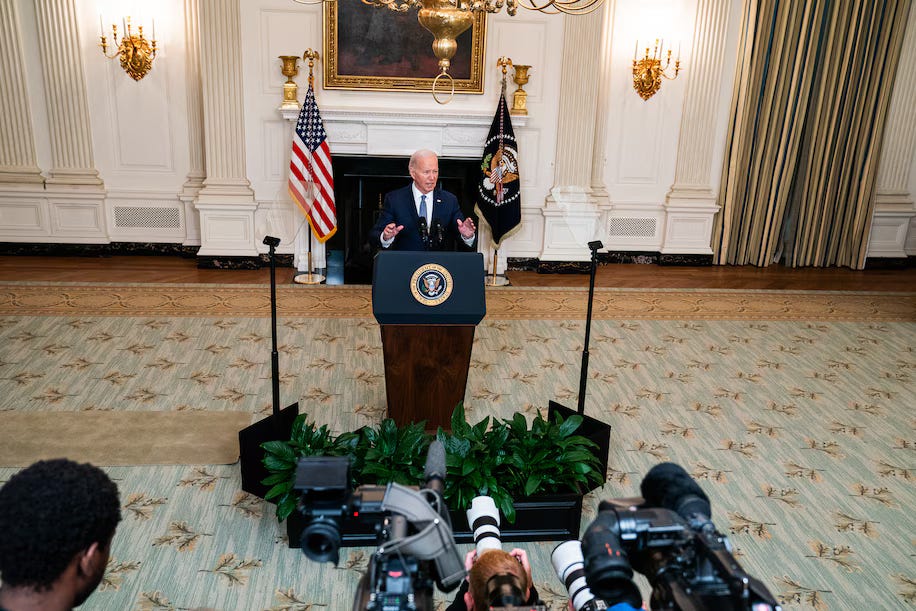Biden Announces Gaza Ceasefire Proposal Amid Rising Criticism
Middle East observers, however, remain, only cautiously optimistic and link this to his domestic imperatives.

The Day Following Trump's Guilty Verdict
The day after former President Donald Trump was found guilty by a New York jury, President Joe Biden on 31st May announced that Israel has agreed, in-principle, to a proposal for an enduring ceasefire in Gaza. This development comes as Biden faces increasing criticism over his policy towards the Israeli-Palestinian conflict, particularly with the presidential election looming in November. The announcement, made live from the White House, was quickly followed by a succinct tweet from the President: “Israel has now offered a roadmap to an enduring ceasefire – and the release of all the hostages. Yesterday, this proposal was transmitted by Qatar to Hamas. Today, I want to lay out its terms for the world.”
Ceasefire Proposal Details
During a news conference at the White House, President Biden detailed the proposal put forward by Israel. This comprehensive plan aims to end the ongoing conflict and involves three distinct phases. The first phase, lasting six weeks, calls for a complete ceasefire and the withdrawal of Israeli forces from populated areas in Gaza. Additionally, it includes the release of captives held in Gaza in exchange for Palestinian prisoners in Israel, alongside a substantial inflow of humanitarian aid to Gaza.
“There are American hostages who would be released at this stage, and we want them home,” Biden stated, noting that Qatar had communicated the proposal to Hamas.
Hamas has responded positively, expressing readiness to engage constructively if Israel commits explicitly to the proposed measures, including the return of displaced Palestinians to their homes in Gaza.
Pressure Mounts on Biden
Biden’s announcement arrives amid a backdrop of escalating conflict in Gaza, with the Israeli military's offensive in Rafah causing significant Palestinian casualties and global outrage. The siege has resulted in severe shortages of essential supplies, leading to warnings of a potential famine.
Domestically, Biden is facing protests and declining support, particularly among Arab Americans, a crucial voter demographic. A recent poll revealed that Biden’s support among Arab Americans has plummeted to less than 20 percent, a worrying sign for his re-election campaign.
The Next Phases
The second phase of the proposal would involve the release of all remaining hostages and the complete withdrawal of Israeli forces from Gaza, ensuring a permanent cessation of hostilities. Biden assured that the ceasefire would continue as long as negotiations progress, even if they extend beyond the initial six weeks.
The final phase focuses on the reconstruction of Gaza and the return of remains of those who were killed. Biden emphasized the importance of Israeli commitment to the proposal, despite potential internal opposition.
A Step Towards Lasting Peace
While the path to a lasting peace in Gaza remains fraught with challenges, President Biden’s announcement marks a significant step towards resolving the conflict. The proposed ceasefire, if successful, could bring much-needed relief to the people of Gaza and address some of the humanitarian crises in the region. This initiative comes at a critical time, as Biden faces increasing criticism and the pressure of the looming presidential election.
Political Implications and Future Prospects
Biden's announcement is particularly significant given the domestic political landscape. His opponent in the presidential race, Donald Trump, has positioned himself as a "political prisoner," leading to a surprising surge in donations from across the USA. Despite being a convicted felon who could face jail time on July 11, when he is scheduled to be sentenced, Trump remains eligible to run for the presidency under the US Constitution.
The ultimate success of Biden’s ceasefire proposal hinges on the sustained commitment of all parties involved and the delicate negotiation process ahead. As the world watches closely, there is cautious optimism that this proposal might pave the way for a more peaceful and stable future in the region.






